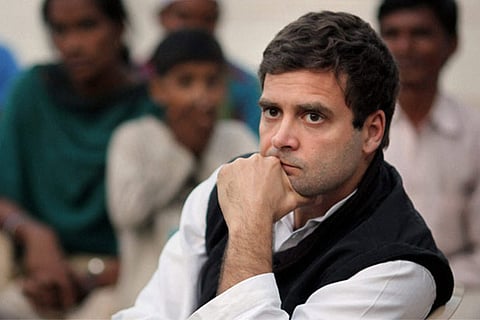

New Delhi
Rahul Gandhi, facing a defamation complaint for his remarks allegedly accusing RSS for assassination of Mahatma Gandhi, has sought its quashing from the apex court which had observed that the leader should not have resorted to "collective denunciation" of an organisation (RSS) and will have to face trial if he does not express regret.
A bench of Justices Dipak Misra and RF Nariman, at the outset, referred to an earlier judgement delivered on a batch of pleas, including the one filed by BJP leader Subramanian Swamy and Gandhi each, challenging the constitutional validity of penal defamation law and said that police cannot be asked by judicial magistrates to probe a private defamation complaint.
It also prima facie found fault with the order of the Maharashtra lower court asking the police to inquire into the allegations against Gandhi and said that instead of "quashing" the case, it may "remand" the matter back to the lower court.
"We have said in the Subramanian Swamy case that the police have no role in private criminal complaints...whatever has to be established, it has to be established by the man (complainant) himself. The magistrates cannot call for a report from the police," the bench said.
It asked senior advocate Kapil Sibal, appearing for the Congress leader, to read relevant portions of the judgement, penned by Justice Misra, in the Subramanian Swamy case, dealing with the power of police and magistrates in criminal defamation cases.
"Police has no role in criminal defamation. It cannot lodge an FIR and a Magistrate cannot seek an inquiry report from police under sections 156 (3) and 202 of the Code of Criminal Procedure. The Magistrate has to himself make inquiry into the allegations...this is altogether a different process," it said.
The bench then deferred the hearing to August 23 and asked the counsel for both sides including senior advocate UR Lalit to address it on legal proposition with regard to power of magistrates and police in such cases.
The bench said that prima facie the procedure of taking cognizance by the judicial magistrate is "erroneous" and in that case, the matter will be remanded back to the trial court.
Rajesh Mahadev Kunte, secretary of Bhiwandi unit of RSS, has alleged in his complaint that Rahul told in an election rally at Sonale on March 6, 2015 that the "RSS people killed Gandhiji". The case is pending before a magisterial court in Bhiwandi in Maharashtra's Thane district.
Lalit, appearing for Kunte, today said the apex court's verdict has come after the lower court had sought a police report in the matter and this (power of police and magistrate in defamation cases) being a new proposition, needed to be debated.
"Criminal defamation has its own limitation. There cannot be a law for 'x' situation and a law for 'y' situation," the court said.
Sibal, during the 30-minutes-long hearing, questioned the locus of Maharashtra police, represented by Additional Solicitor General Tushar Mehta, in the matter saying "How does the state come in the picture? It is a private complaint."
The bench said that the police, which has no role to probe a private criminal defamation complaint, can deal with such cases when question of territorial jurisdiction arises.
At the far end of the hearing, the court made clear that the proceedings before the trial court would remain adjourned.
Earlier, the bench had questioned the speech made by Rahul and wondered "why he made a speech quoting wrong historical fact".
The apex court had said that they have applied their mind and Rahul Gandhi will have to face the trial in the case.
The penal provisions make defamation an offence punishable by up to a two-year jail term.
Kunte had alleged that the Congress leader had sought to tarnish the reputation of the Sangh through his speech.
Following the complaint, the magistrate's court had initiated proceedings and issued notice to Rahul directing him to appear before it. Rahul was summoned to appear before the trial court on January 6, this year.
The Congress leader then approached the High Court seeking exemption from appearance and quashing of the case.
The High Court had dismissed the petition and refused to grant stay on its order, leading to an appeal in the Supreme Court.
Visit news.dtnext.in to explore our interactive epaper!
Download the DT Next app for more exciting features!
Click here for iOS
Click here for Android